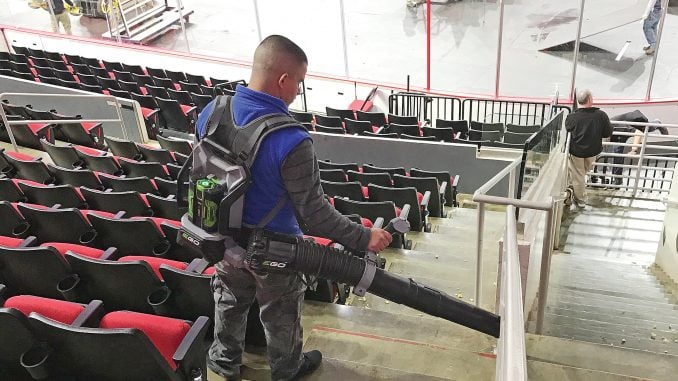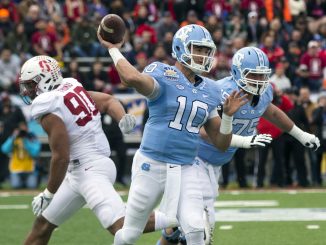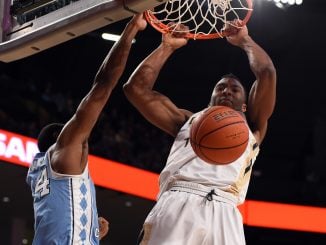
RALEIGH — For about six dozen people in PNC Arena on Feb. 10, there was a bright side to the Wolfpack’s four-point loss to the hated Tar Heels: They could start work on time.
“There was no overtime,” said PNC Arena general manager Dave Olsen, “and the students didn’t storm the court afterward.”
For several harrowing minutes in the second half, both scenarios seemed on the verge of taking place, which would have eaten into the three hours that Olsen’s crew had to change over PNC from a basketball arena to a hockey rink.

It was the fourth time this season that the arena hosted an NC State basketball game and an NHL Hurricanes game on the same day. Each of them had given the crew at least three hours to get the work done. “As long as we have a three-hour window, we’re good,” Olsen said.
It also helped that the arena was being flipped from basketball to hockey — an easier change than in the opposite direction. “It’s always easier to tear something down than to build it,” Olsen explained.
The speed record for the changeover is an hour, 12 minutes. “We just did an hour 20 a couple weeks ago,” said director of operations Craig Stover.
There would be no records set this time. The crew was tired and nowhere near done with a grueling stretch of the schedule. The Hurricanes had played the night before, meaning the crew was busy until about 2:30 a.m. switching the arena from hockey to basketball. With a Harlem Globetrotters game scheduled the following afternoon, the crew would have to stay late after the Canes game to make the switch again — for a total of three changeovers in a 27-hour period.
“We’re just going to go nice and easy and make sure no one gets hurt,” Olsen said.
Nice and easy doesn’t mean slow and leisurely, however.

“The key is to have everyone in constant motion, all the time,” Stover said, and, despite their lack of sleep, the crew complies.
There are 65 people dedicated to changing the arena floor over. Another smaller crew cleans the stands and suites. Other teams change the scoreboard and arena ribbon board graphics and prepare the concession stands. “They need to be restocked,” Olsen said, “and we have to add items. We don’t sell beer at college games, for instance.”
While the NC State players hit the showers, the crew begins work. NC State banners are taken down and folded up for storage. Several carts are loaded with the chairs from the student sections and press row. In five minutes, the chairs are gone. In another four minutes, the risers that made up the student seating are disassembled and carted off as well.
Teams begin taking apart the basketball court, piece-by-piece. Each section weighs about 80 pounds and needs to be covered with protective plastic, so it isn’t scratched as it gets stacked on a cart. It takes 34 minutes for the entire court to be broken down and carted off, and three forklifts bring out the glass that will ring the hockey rink.
 That requires an additional precaution. Members of the crew don hockey helmets, just like the ones the players wear, whenever they handle glass or walk on the soon-to-be uncovered ice.
That requires an additional precaution. Members of the crew don hockey helmets, just like the ones the players wear, whenever they handle glass or walk on the soon-to-be uncovered ice.
With the help of forklifts, the team bench areas and penalty boxes are built.
The seating bowl also has several changes from NC State basketball. Additional seats are installed around the arena, and railings are erected to block off paths that allowed fans to reach the arena floor for basketball.

A little over an hour in, the floor crew is ready to start pulling up the arena floor and uncover the ice. The temperature begins to noticeably drop in the arena.
The crew makes short work of the floor, carting off the last piece 34 minutes after the first. While they work, protective netting is attached to the top of the glass, TV cameras are put in place behind the goals, and someone brings equipment to the team bench areas.
At 5:53 p.m. — an hour and 53 minutes after the final horn of NC State’s game and an hour and seven minutes before the doors reopen for the Hurricanes game — the ice resurfacing is complete and the arena is ready to go.
“Now, we’ll give them pizza and let them watch the game,” Stover said. And then the changeover will begin again, in the opposite direction.
“All in a day’s work,” he said.



